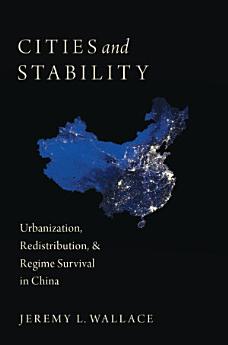Cities and Stability: Urbanization, Redistribution, and Regime Survival in China
জুন ২০১৪ · Oxford University Press
৪.০star
১ টা পৰ্যালোচনাreport
ইবুক
272
পৃষ্ঠা
family_home
যোগ্য
info
reportমূল্যাংকন আৰু পৰ্যালোচনা সত্যাপন কৰা হোৱা নাই অধিক জানক
এই ইবুকখনৰ বিষয়ে
China's management of urbanization is an under-appreciated factor in the regime's longevity. The Chinese Communist Party fears "Latin Americanization" -- the emergence of highly unequal megacities with their attendant slums and social unrest. Such cities threaten the survival of nondemocratic regimes. To combat the threat, many regimes, including China's, favor cities in policymaking. Cities and Stability shows this "urban bias" to be a Faustian Bargain: cities may be stabilized for a time, but the massive in-migration from the countryside that results can generate the conditions for political upheaval. Through its hukou system of internal migration restrictions, China has avoided this dilemma, simultaneously aiding urbanites and keeping farmers in the countryside. The system helped prevent social upheaval even during the Great Recession, when tens of millions of laid-off migrant workers dispersed from coastal cities. Jeremy Wallace's powerful account forces us to rethink the relationship between cities and political stability throughout the developing world.
মূল্যাংকন আৰু পৰ্যালোচনাসমূহ
৪.০
১ টা পৰ্যালোচনা
লিখকৰ বিষয়ে
Jeremy L. Wallace is Assistant Professor of Political Science at the Ohio State University.
এই ইবুকখনক মূল্যাংকন কৰক
আমাক আপোনাৰ মতামত জনাওক।
পঢ়াৰ নির্দেশাৱলী
স্মাৰ্টফ’ন আৰু টেবলেট
Android আৰু iPad/iPhoneৰ বাবে Google Play Books এপটো ইনষ্টল কৰক। ই স্বয়ংক্রিয়ভাৱে আপোনাৰ একাউণ্টৰ সৈতে ছিংক হয় আৰু আপুনি য'তে নাথাকক ত'তেই কোনো অডিঅ'বুক অনলাইন বা অফলাইনত শুনিবলৈ সুবিধা দিয়ে।
লেপটপ আৰু কম্পিউটাৰ
আপুনি কম্পিউটাৰৰ ৱেব ব্রাউজাৰ ব্যৱহাৰ কৰি Google Playত কিনা অডিঅ'বুকসমূহ শুনিব পাৰে।
ই-ৰীডাৰ আৰু অন্য ডিভাইচ
Kobo eReadersৰ দৰে ই-চিয়াঁহীৰ ডিভাইচসমূহত পঢ়িবলৈ, আপুনি এটা ফাইল ডাউনল’ড কৰি সেইটো আপোনাৰ ডিভাইচলৈ স্থানান্তৰণ কৰিব লাগিব। সমৰ্থিত ই-ৰিডাৰলৈ ফাইলটো কেনেকৈ স্থানান্তৰ কৰিব জানিবলৈ সহায় কেন্দ্ৰত থকা সবিশেষ নিৰ্দেশাৱলী চাওক।





